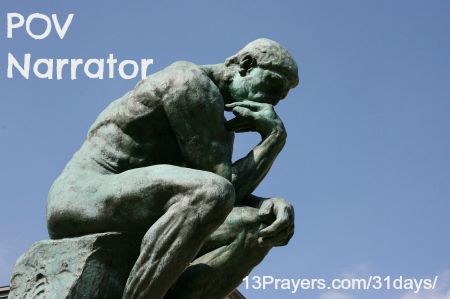Can I read your mind? Or the mind of your narrator?
Today’s work on choosing a narrator is in 2 parts.
Part 1: Person
When writing, you have to choose how to view the story. Is the narrator one of the characters? (First Person) Then use “I, me, my” throughout. For example:
• I woke in the barn. My head hurt.
There is second person, but it is rarely used and difficult to do. You make the reader feel like they are telling the action.
• You woke in the barn. Your head hurt.
Third person is the most common. Use “he, she, they” throughout. For example:
• He woke in the barn. His head hurt.
Part 2: Omniscience.
How much do you want your reader to know? Just what the reader sees and hears? Or do you want them inside some character’s head, reading their thoughts.
For instance:
• It took longer than Ike Maxwell expected for the ceiling beams to come into focus. He didn’t know the time or why he was in the barn.
You just got a snapshot of what’s inside Ike’s head. Or, in this case, what’s not there. He doesn’t know the time or why he’s in the barn. You’re a mind reader.
Or:
• “The barn? Why am I in the barn?” Ike Maxwell mumbled. He blinked hard, but darkness masked the clock.
In the second example, we only know what we hear and see. We get the same info, but in a different way.
There are 3 levels of omniscience:
1. Third-person omniscient: the reader knows the thoughts of every character
2. Third-person limited: the reader knows only one character’s thoughts, either throughout the entire work or in a specific section
3. Third-person objective: the narrator knows no character’s thoughts and can only tell the reader what is seen or heard
Me? While this is something you will monitor/fix during revision, I like to keep a note on my monitor frame that reminds me whose head I can live in. But that’s just me. Choosing Justice is in 3rd person limited. I’m not always in someone’s head. And I limit my psychic abilities to just Ike and Justice. The first bullet point in part 2 is actually the first line of the book.
You? Have you ever wanted to be a mind reader? Well, this is your chance.
Remember:
My FREE novel planning templates are available beginning June 14, 2021 from my Novel Planning page here, along with links to the brief blog posts that explain them. You will also find links to posts describing my additional planning templates that are available here in my Shop.
Be sure to post any questions or comments on my Facebook page 13Prayers here.
 I love when God gives us a glimpse into His power. 1 Samuel 16-17 has David – before he assumes the throne – take up a battle that was too darn scary for trained warriors. He defeated a battlefield bully with a rock.
I love when God gives us a glimpse into His power. 1 Samuel 16-17 has David – before he assumes the throne – take up a battle that was too darn scary for trained warriors. He defeated a battlefield bully with a rock.
When you take a stand for God:
- Gather what you have
- Trust God to aim you and your skills in the right direction for maximum effectiveness
- Let loose and let God take over


